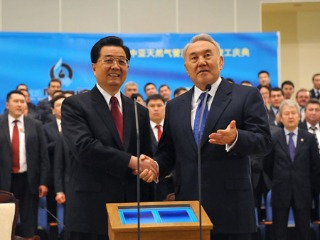Kazakhstan Adopts New Foreign Policy Concept
By Georgiy Voloshin (the 05/02/2014 issue of the CACI Analyst)
On January 29, Kazakhstan's President Nursultan Nazarbayev approved his country’s new foreign policy concept for the period 2014-2020. As the document states, it was developed in line with the “Kazakhstan 2050” strategy made public by President Nazarbayev in December 2012 and further detailed in his recent address to the nation last month. The major goal of this strategic initiative is to ensure Kazakhstan’s entry into the elite club of the world’s 30 most developed countries by the turn of this century.
President Nazarbayev Sets Priority Goals Up to 2050
By Georgiy Voloshin (the 22/01/2014 issue of the CACI Analyst)
On January 17, Kazakhstan’s President Nursultan Nazarbayev made his annual address to the Nation, outlining key government priorities for the upcoming year. Most of his speech was dedicated to the implementation of the “Kazakhstan 2050” strategy that he unveiled in December 2012. An earlier strategy entitled “Kazakhstan 2030” was adopted back in 1997 and subsequently declared largely implemented by the president. In line with Kazakhstan’s new strategic course, the country has set out to become one of the world’s top 30 developed nations by the turn of this century.
“CACI Analyst, January 08, 2014”
Kazakhstan Drifts to China Amid Tension with Russia
By Dmitry Shlapentokh (the 08/01/2014 issue of the CACI Analyst)
Kazakhstan is a member of the Russian-sponsored Custom Union, and intends to join the Eurasian Union. Yet, Kazakhstan’s foreign policy indicates that it regards Russia as just one among several partners, with which it cooperates in some areas but also competes against in others. The transportation of oil and natural gas has increasingly become a bone of contention, whereas China has emerged as a viable alternative. China has provided Kazakhstan with alternative transportation routes such as railroads, along with considerable investment, providing alternatives to Russia as well as the West. Neither the Russian-led Eurasian Union, nor any Western economic or geopolitical construction, is likely to monopolize Astana's attention.



